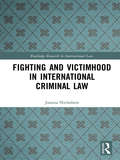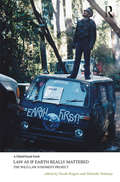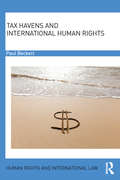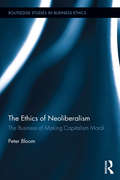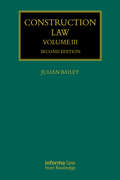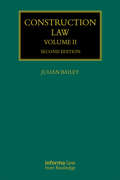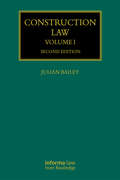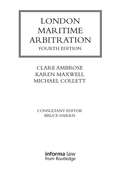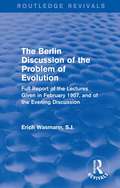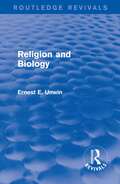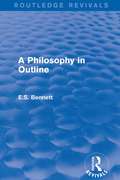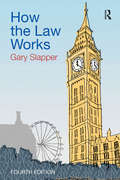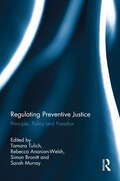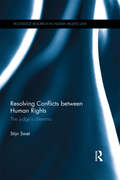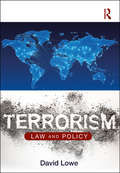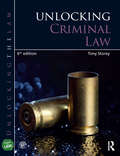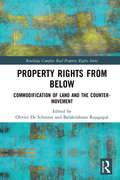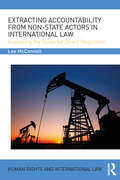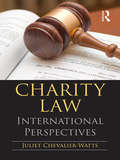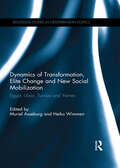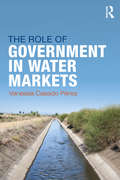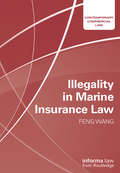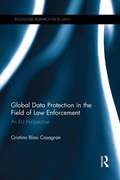- Table View
- List View
Fighting and Victimhood in International Criminal Law (Routledge Research in International Law)
by Joanna NicholsonThe act of fighting or being a fighter has certain consequences in international law. The most obvious example can be found in international humanitarian law, where a distinction is drawn between fighters and civilians, with fighters being military objectives and civilians being protected from attack. Another example is from international human rights law, where it has been held that the particular characteristics of military life have to be taken into account when interpreting the human rights of members of state armed forces. This volume focuses on the field of international criminal law and asks the question: what relevance does fighting have to victimhood in international criminal law? Among the topics which are explored are: how have international criminal courts and tribunals untangled lawful casualties of war from victims of war crimes? How have they determined who is a member of an organised armed group and who is not? What crimes can those who fight be victims of during hostilities? When does it become relevant in international criminal law that an alleged victim of a crime was a person hors de combat rather than a civilian? Can war crimes be committed against members of non-opposing forces? Can persons hors de combat be victims of crimes against humanity and genocide? What special considerations surround peacekeepers and child soldiers as victims of international crimes? The author carries out an in-depth exploration of case law from international criminal courts and tribunals to assess how they have dealt with these questions. She concludes that the import of fighting upon victimhood in the context of international criminal law has not always been appreciated to the extent it should have been.
Law as if Earth Really Mattered: The Wild Law Judgment Project (Law, Justice and Ecology)
by Nicole Rogers Michelle MaloneyThis book is a collection of judgments drawn from the innovative Wild Law Judgment Project. In participating in the Wild Law Judgment Project, which was inspired by various feminist judgment projects, contributors have creatively reinterpreted judicial decisions from an Earth-centred point of view by rewriting existing judgments, or creating fictional judgments, as wild law. Authors have confronted the specific challenges of aligning existing Western legal systems with Thomas Berry’s philosophy of Earth jurisprudence through judgment writing and rewriting. This book thus opens up judicial decision-making and the common law to critical scrutiny from a wild law or Earth-centred perspective. Based upon ecocentric rather than human-centred or anthropocentric principles, Earth jurisprudence poses a unique critical challenge to the dominant anthropocentric or human-centred focus and orientation of the common law. The authors interrogate the anthropocentric and property rights assumptions embedded in existing common law by placing Earth and the greater community of life at the centre of their rewritten and hypothetical judgments. Covering areas as diverse as tort law, intellectual property law, criminal law, environmental law, administrative law, international law, native title law and constitutional law, this unique collection provides a valuable tool for practitioners and students who are interested in learning more about the emerging ecological jurisprudence movement. It helps us to see more clearly what a new system of law might look like: one in which Earth really matters.
Tax Havens and International Human Rights (Human Rights and International Law)
by Paul BeckettThis book sails in uncharted waters. It takes a human rights-based approach to tax havens, and is a detailed analysis of structures and the laws that generate and support these. It makes plain the unscrupulous or merely indifferent ways in which, using tax havens, businesses and individuals systematically undermine and for all practical purposes eliminate access to remedies under international human rights law. It exposes as abusive of human rights a complex structural web of trusts, companies, partnerships, foundations, nominees and fiduciaries; secrecy, immunity and smoke screens. It also lays bare the cynical manipulation by tax havens of traditional legal forms and conventions, and the creation of entities so bizarre and chimeric that they defy classification. Yet from the perspective of the tax havens themselves, these are entirely legitimate; the product of duly enacted domestic laws. This book is not a work of investigative journalism in the style of the Pulitzer Prize-winning authors of The Panama Papers, exposing political or financial corruption, money laundering or the financing of terrorism. All those elements are present of course, but the focus is on international human rights and how tax havens do not merely facilitate but actively connive at their breach. The tax havens are compromising the international human rights legal continuum.
The Ethics of Neoliberalism: The Business of Making Capitalism Moral (Routledge Studies in Business Ethics)
by Peter BloomThe 21st century is the age of "neo-liberalism" – a time when the free market is spreading to all areas of economic, political and social life. Yet how is this changing our individual and collective ethics? Is capitalism also becoming our new morality? From the growing popular demand for corporate social responsibility to personal desire for "work-life balance" it would appear that non-market ideals are not only surviving but also thriving. Why then does it seem that capitalism remains as strong as ever? The Ethics of Neoliberalism boldly proposes that neoliberalism strategically co-opts traditional ethics to ideologically and structurally strengthen capitalism. It produces "the ethical capitalist subject" who is personally responsible for making their society, workplace and even their lives "more ethical" in the face of an immoral but seemingly permanent free market. Rather than altering our morality, neoliberalism "individualizes" ethics, making us personally responsible for dealing with and resolving its moral failings. In doing so, individuals end up perpetuating the very market system that they morally oppose and feel powerless to ultimately change. This analysis reveals the complex and paradoxical way capitalism is currently shaping us as "ethical subjects". People are increasingly asked to ethically "save" capitalism both collectively and personally. This can range from the "moral responsibility" to politically accept austerity following the financial crisis to the willingness of employees to sacrifice their time and energy to make their neoliberal organizations more "humane" to the efforts by individuals to contribute to their family and communities despite the pressures of a franetic global business environment. Neoliberalism, thus, uses our ethics against us, relying on our "good nature" and sense of personal responsibility to reduce its human cost in practice. Ironically
Construction Law: Volume III (Construction Practice Series)
by Julian BaileyNow in its second edition, Construction Law is the standard work of reference for busy construction law practitioners, and it will support lawyers in their contentious and non-contentious practices worldwide. Published in three volumes, it is the most comprehensive text on this subject, and provides a unique and invaluable comparative, multi-jurisdictional approach. This book has been described by Lord Justice Jackson as a "tour de force", and by His Honour Humphrey LLoyd QC as "seminal" and "definitive". This new edition builds on that strong foundation and has been fully updated to include extensive references to very latest case law, as well as changes to statutes and regulations. The laws of Hong Kong and Singapore are also now covered in detail, in addition to those of England and Australia. Practitioners, as well as interested academics and post-graduate students, will all find this book to be an invaluable guide to the many facets of construction law.
Construction Law: Volume II (Construction Practice Series)
by Julian BaileyNow in its second edition, Construction Law is the standard work of reference for busy construction law practitioners, and it will support lawyers in their contentious and non-contentious practices worldwide. Published in three volumes, it is the most comprehensive text on this subject, and provides a unique and invaluable comparative, multi-jurisdictional approach. This book has been described by Lord Justice Jackson as a "tour de force", and by His Honour Humphrey LLoyd QC as "seminal" and "definitive". This new edition builds on that strong foundation and has been fully updated to include extensive references to very latest case law, as well as changes to statutes and regulations. The laws of Hong Kong and Singapore are also now covered in detail, in addition to those of England and Australia. Practitioners, as well as interested academics and post-graduate students, will all find this book to be an invaluable guide to the many facets of construction law.
Construction Law: Volume I (Construction Practice Series)
by Julian BaileyNow in its second edition, Construction Law is the standard work of reference for busy construction law practitioners, and it will support lawyers in their contentious and non-contentious practices worldwide. Published in three volumes, it is the most comprehensive text on this subject, and provides a unique and invaluable comparative, multi-jurisdictional approach. This book has been described by Lord Justice Jackson as a "tour de force", and by His Honour Humphrey LLoyd QC as "seminal" and "definitive". This new edition builds on that strong foundation and has been fully updated to include extensive references to very latest case law, as well as changes to statutes and regulations. The laws of Hong Kong and Singapore are also now covered in detail, in addition to those of England and Australia. Practitioners, as well as interested academics and post-graduate students, will all find this book to be an invaluable guide to the many facets of construction law.
London Maritime Arbitration (Lloyd's Shipping Law Library)
by Clare Ambrose Karen Maxwell Michael CollettNow in its fourth edition, this book provides detailed and practical guidance on how London Maritime Arbitration works in practice, against the background of English arbitration law and the Arbitration Act 1996. This unique title is the only book on the market that offers a practical focus on maritime disputes, while also providing a clear exposition of general principles of English arbitration law, with discussion and analysis of applicable legislation and case law. Arbitration practitioners will find everything that they need in one comprehensive book. New to this edition: Guidance on the new LMAA Terms 2017 against the background of English arbitration law, including the Arbitration Act 1996. Fully updated case law and analysis of legal developments, including Brexit. Comparative references to ad hoc and LCIA arbitration. New section on salvage arbitration, Brexit, third party funding. Summaries comparing alternative jurisdictions including Singapore, Hong Kong, Hamburg and New York This book will be invaluable to maritime arbitration practitioners both in private practice and in-house, as well as maritime professionals, such as those working at P&I Clubs, brokers, ship owners, managers and charterers; and more generally to anybody concerned with London arbitration.
Organizational Change for Corporate Sustainability: A Guide For Leaders And Change Agents Of The Future (Understanding Organizational Change Ser.)
by Tim Williams Suzanne Benn Melissa EdwardsSince this classic book was first published in 2003, sustainability has increasingly been accepted as standard business practice for leading corporations, while the science itself has revealed how human activity has become the dominant force influencing irreversible changes in the planetary systems. The fourth edition of this trailblazing book on corporate sustainability provides new insights into how organizations can transition towards a more responsible way of conducting their business. It charts new thinking on value creation, business models and organizational purpose as the basis of a broader-based transition to a sustainable society. The sustainability phase model has been substantially revised to incorporate emergent approaches in sustainable supply chain management, strategic sustainability, sustainability-oriented innovation and new business models. There is a companion website that contains a range of materials to support learning. This new edition with the authors’ unified approach to sustainable business reshapes its plan of action to bring about corporate change by drawing in new management theory and practice on strategy-making and leadership, making it core reading for students and researchers of sustainability and business, organizational change and corporate social responsibility.
The Berlin Discussion of the Problem of Evolution: Full Report of the Lectures Given in February 1907, and of the Evening Discussion
by Erich Wasmann, S.J.First published in 1909, this book collects the author’s lectures on the ‘problem of evolution’ and the resultant debate. The first considers the validity of the Theory of Evolution and whether it is in opposition to the Christian view of creation. The second examines the assertion that evolution harmonises only with Monism rather than Theism and which of the two views is preferable. It also looks at the popular identification of Darwinism with evolution, if it is scientific and the results this leads to. The third looks at man’s position in the problem of evolution — whether we are bound to bring in considerations higher than the zoological — and the evidence for our descent from ‘brutes’.
Religion and Biology
by Ernest E. UnwinFirst published in 1922, this book represents an attempt to outline the biological approach to the questions of religious thought. The author posits the book as a contribution to religious thought in relation to the purpose of God in Nature, providing readers with an overview of the advances and changes in thought that had occurred in the years before the book was written. The examinations of the nature of man and of evolution in relation to religion make up the bulk of the book along with a look at the argument from beauty. The book will be of interest to students of religion, biology and philosophy.
A Philosophy in Outline (Routledge Revivals)
by E.S. BennettFirst published in 1931, this book provides a brief overview of the essentials of philosophy. It aims to combat the notion of the inaccessibility of philosophy by providing an introduction to its history and what the author believes to a ‘minimum dose…of incontrovertible philosophical truth’. The book merely assumes an ordinary level of adult education and offers an outline of the key areas of philosophy — consciousness, reality, experience, Life, God, love, aesthetics, conduct, logic — and as such will be of interest as a very useful starting point for anyone wishing to undertake further studies.
How the Law Works
by Gary Slapper‘How the Law Works is a gem of a book, for law students and for everyone else. It is a must read for anyone interested in how society is shaped and controlled via law.’ Dr Steven Vaughan, solicitor, Senior Lecturer, Birmingham Law School ‘How the Law Works is a comprehensive, witty and easy-to-read guide to the law. I thoroughly recommend it to non-lawyers who want to improve their knowledge of the legal system and to potential students as an introduction to the law of England and Wales.’ HH Judge Lynn Tayton QC Reviews of the first edition: ‘A friendly, readable and surprisingly entertaining overview of what can be a daunting and arcane subject to the outsider.’ The Law Teacher ‘An easy-to-read, fascinating book . . . brimful with curios, anecdote and explanation.’ The Times How the Law Works is a refreshingly clear and reliable guide to today’s legal system. Offering interesting and comprehensive coverage, it makes sense of all the curious features of the law in day to day life and in current affairs. Explaining the law and legal jargon in plain English, it provides an accessible entry point to the different types of law and legal techniques, as well as today’s compensation culture and human rights law. In addition to explaining the role of judges, lawyers, juries and parliament, it clarifies the mechanisms behind criminal and civil law. How the Law Works is essential reading for anyone approaching law for the first time, or for anyone who is interested in an engaging introduction to the subject’s bigger picture.
Regulating Preventive Justice: Principle, Policy and Paradox
by Sarah Murray Simon Bronitt Tamara Tulich Rebecca Ananian-WelshLike medicine, law is replete with axioms of prevention. ‘Prevention is better than cure’ has a long pedigree in both fields. 17th century jurist Sir Edward Coke observed that ‘preventing justice excelleth punishing justice’. A century later, Sir William Blackstone similarly stated that ‘preventive justice is ...preferable in all respects to punishing justice’. This book evaluates the feasibility and legitimacy of state attempts to regulate prevention. Though prevention may be desirable as a matter of policy, questions are inevitably raised as to its limits and legitimacy, specifically, how society reconciles the desirability of averting risks of future harm with respect for the rule of law, procedural fairness and human rights. While these are not new questions for legal scholars, they have been brought into sharper relief in policy and academic circles in the wake of the September 11 terrorist attacks. Over the past 15 years, a body of legal scholarship has tracked the intensified preventive focus of anti-terrorism law and policy, observing how this focus has impacted negatively upon traditional legal frameworks. However, preventive law and policy in other contexts, such as environmental protection, mental health, immigration and corruption has not received sustained focus. This book extends that body of scholarship, through use of case studies from these diverse regulatory settings, in order to examine and critique the principles, policies and paradoxes of preventive justice. "Whereas earlier scholars looked upon preventive justice as a source and means of regulation, the powerfully argued contributions to this volume provide forceful reasons to consider whether we would do better talk about regulating preventive justice." Professor Lucia Zedner, Oxford University
Resolving Conflicts between Human Rights: The Judge's Dilemma (Routledge Research in Human Rights Law)
by Stijn SmetUnder the influence of the global spread of human rights, legal disputes are increasingly framed in human rights terms. Parties to a legal dispute can often invoke human rights norms in support of their competing claims. Yet, when confronted with cases in which human rights conflict, judges face a dilemma. They have to make difficult choices between superior norms that deserve equal respect. In this high-level book, the author sets out how judges the world over could resolve conflicts between human rights. He presents an innovative legal theoretical account of such conflicts, questioning the relevance of the influential proportionality test to their resolution. Instead, the author develops a novel resolution framework, specifically designed to tackle human rights conflicts. The book combines concerted normative theory with profound practical analysis, firmly rooting its theoretical arguments in human rights practice. Although the analysis draws primarily on the case law of the European Court of Human Rights, the book’s core arguments are applicable to judicial practice in general. As such, the book should be of great interest to academics, postgraduate students and legal practitioners in Europe and beyond. The book is particularly suited for use in advanced courses on legal theory, human rights law and jurisprudence.
Terrorism: Law and Policy
by David LoweTerrorism: Law and Policy provides a comprehensive socio-legal analysis of issues related to terrorist activity. Aimed at both undergraduate and postgraduate students, the book takes a comparative approach to the law related to terrorism in a number of states, mainly those in Europe, North America, Australia and New Zealand. Beginning with an examination of the background to various currently active terrorist groups, the book focuses on those groups which are currently active and which pose a threat to security, especially at the international level. The chapters take the reader through the legal definitions of terrorism contained in various states’ statutory provisions and examine how the courts have interpreted terrorism in those states’ jurisdictions. The main aim of any terrorist investigation is prevention and so the book examines the various statutory preventative measures that states have introduced and explores the legal issues surrounding surveillance, terrorism intelligence exchange, radicalisation, use of social media, quasi-criminal provisions, asset-freezing and the nexus between terrorist activity and organised crime. Bringing together a number of themes related to terrorism and security from a uniquely legal perspective, this book builds a comparative picture of the legal counter-terrorism interventions states are adopting to increase co-operation and adopt a more united approach in the face of the international terrorism threat.
Unlocking Criminal Law
by Tony StoreyUNLOCKING CRIMINAL LAW will help you grasp the main concepts of the subject with ease. Containing accessible explanations in clear and precise terms that are easy to understand, it provides an excellent foundation for learning and revising Criminal Law. The information is clearly presented in a logical structure and the following features support learning helping you to advance with confidence: Clear learning outcomes at the beginning of each chapter set out the skills and knowledge you will need to get to grips with the subject Key Facts boxes throughout each chapter allow you to progressively build and consolidate your understanding End-of-chapter summaries provide a useful check-list for each topic Cases and judgments are highlighted to help you find them and add them to your notes quickly Frequent activities and self-test questions are included so you can put your knowledge into practice Sample essay questions with annotated answers prepare you for assessment Glossary of legal terms clarifies important definitions
Property Rights from Below: Commodification of Land and the Counter-Movement (Routledge Complex Real Property Rights Series)
by Olivier De Schutter Balakrishnan RajagopalRecent years have seen a globalization of property rights as the Western conception of property over land has extended across the world. As formerly community-owned land and natural resources are privatized and titling schemes proliferate, Property Rights from Below questions the trend toward treating land as a commodity and explores alternatives to the Western model. As we enter an era of resource scarcity and as competition for land and associated natural resources increases, purchasing power cannot become the sole criterion for land allocation; and the law of supply and demand in increasingly financialized markets cannot become the sole metric through which the value of land is determined. Using a range of examples from around the world, Property Rights from Below demonstrates that alternatives to this model often emerge from social innovations supported by local communities and that there is an urgent need for a broader political imagination when it comes to land governance. This innovative cross-disciplinary perspective on the pressing problems surrounding global property rights will be of interest to academics, students and professionals with an interest in property law, development economics and land governance.
Extracting Accountability from Non-State Actors in International Law: Assessing the Scope for Direct Regulation (Human Rights and International Law)
by Lee James McConnellThe human rights of communities in many resource-rich, weak governance States are adversely affected, not only by the acts of States and their agents, but also by powerful non-State actors. Contemporary phenomena such as globalisation, privatisation and the proliferation of internal armed conflict have all contributed to the increasing public influence of these entities and the correlative decline in State power. This book responds to the persistent challenges stemming from non-State actors linked to extractive industries. In light of the intersecting roles of multinational enterprises and non-State armed groups in this context, these actors are adopted as the primary analytical vehicles. The operations of these entities highlight the practical flaws of existing accountability regimes and permit an exploration of the theoretical challenges that preclude their direct legal regulation at the international level. Drawing insights from discursive democracy, compliance theories and the Pure Theory of Law, the book establishes a conceptual foundation for the creation of binding international obligations addressing non-State actors. Responding to the recent calls for a binding business and human rights treaty at the UN Human Rights Council, and the growing influence of armed non-State actors, the book makes a timely contribution to debates surrounding the direction of future developments in the field of international human rights law.
Charity Law: International Perspectives
by Juliet Chevalier-WattsThis work provides an analytical and comparative analysis of the development of charity law, as well as providing a critical commentary on a number of contemporary changes within the charity law field across a range of common law jurisdictions. The book follows earlier studies which cover a similar, and traditional, jurisdictional spread, but which are now dated. It further considers in detail charity law issues within Hong Kong and Singapore, about which there has been historically more limited charity law discussion. The area is growing in terms of practical legal and academic interest.
Dynamics of Transformation, Elite Change and New Social Mobilization: Egypt, Libya, Tunisia and Yemen (Routledge Studies in Mediterranean Politics)
by Muriel Asseburg and Heiko WimmenThe political transformations initiated by the so-called Arab Spring in Egypt, Libya, Tunisia and Yemen have been marked by strong political contention, continued social mobilization and, albeit to different degrees, weak central state institutions. This book proposes that, rather than agreed roadmaps of institutional change (e.g. elections, drawing up new constitutions) and centrally crafted transition processes, it has been the competition of key political actors for resources of political power and control that has set the pace and influenced the direction and depth of the transformation processes. Hence, the contributions in this volume use an actor-centred approach. Two perspectives are assumed: first key political actors – referring to the "Politically Relevant Elite (PRE)"– are identified and their motivations as well as their strategies and capacities to steer the transformation process. Secondly , the authors investigate the capacity of politically "Mobilized Publics" to exert influence on agenda setting and decision making, ask to what extent popular and social movements have emerged as political actors in their own right, and to what extent such forms of bottom-up participation have constituted a fundamental change to the political culture of these countries. Both avenues of inquiry analyze how the elites are constrained by continued social mobilization, how they engage with mobilized publics to promote their own agendas, and whether the extended scope of popular participation contributes to the legitimacy and stability of the emerging political orders, or causes disruption, fragmentation and conflict. This book was previously published as a special issue of Mediterranean Politics.
The Role of Government in Water Markets
by Vanessa Casado-PerezWhile water is an increasingly scarce resource, most existing methods to allocate it are neither economically nor environmentally efficient. In these circumstances, water markets offer developed countries a form of regulatory response capable of overcoming many of the shortcomings of current water management. The debate on water markets is, however, a polarized one. This is mostly a result of the misunderstanding of the roles played by governments in water markets. Proponents mistakenly portrayed them as leaving governments, for the most part, out of the picture. Opponents, in turn, understand commodification of water and administration by public agencies as incompatible. Casado Pérez argues that both sides of the debate overlook that water markets require a deeper and more varied governmental intervention than markets for other goods. Drawing on economic theories of regulation based on market failure, she explains the different roles governments should play to ensure a well-functioning water market, and concludes that only the visible hand of governments can ensure the success of water markets. Casado Pérez proves her case by examining case studies of California and Spain to assess the success of their water markets. She explores why water markets were more extensively institutionalized in California than in Spain in the first ten years since their introduction and how the role of governments in each case study impacted water market operation. This unique analysis of governmental roles in water markets, alongside qualitative studies of California and Spain, offers valuable guidance to understand environmental markets and to face the challenges presented by water management in regions with periodical droughts.
Illegality in Marine Insurance Law (Contemporary Commercial Law)
by Feng WangIllegality in Marine Insurance Law is the first book to deal specifically with illegality in the context of marine insurance law. Previously, this issue has only ever been partially covered within analysis and criticism of Section 41 of the Marine Insurance Act 1906 and warranties. However, Dr Wang Feng goes much further than this by considering its impact on the common law relevant to marine insurance in many jurisdictions worldwide. The book addresses whether the existing law represents an accurate codification of the former authorities and whether Section 41 truly reflects existing legal principles. As well as this, the book examines how correctly to approach illegality within the context of marine insurance, considering the fundamental changes to the rule of breach of warranty introduced by the Insurance Act 2015. Of interest to academic researchers and practitioners in common law and civil law jurisdictions, this book provides rigorous analysis of the illegality issue and a conceptual approach for various approaches to reform marine insurance law. It is a unique and comprehensive guide to illegality in marine insurance law.
Illegality in Marine Insurance Law (Contemporary Commercial Law)
by Feng WangIllegality in Marine Insurance Law is the first book to deal specifically with illegality in the context of marine insurance law. Previously, this issue has only ever been partially covered within analysis and criticism of Section 41 of the Marine Insurance Act 1906 and warranties. However, Dr Wang Feng goes much further than this by considering its impact on the common law relevant to marine insurance in many jurisdictions worldwide. The book addresses whether the existing law represents an accurate codification of the former authorities and whether Section 41 truly reflects existing legal principles. As well as this, the book examines how correctly to approach illegality within the context of marine insurance, considering the fundamental changes to the rule of breach of warranty introduced by the Insurance Act 2015.Of interest to academic researchers and practitioners in common law and civil law jurisdictions, this book provides rigorous analysis of the illegality issue and a conceptual approach for various approaches to reform marine insurance law. It is a unique and comprehensive guide to illegality in marine insurance law.
Global Data Protection in the Field of Law Enforcement: An EU Perspective (Routledge Research in EU Law)
by Cristina Blasi CasagranThis study examines a key aspect of regulatory policy in the field of data protection, namely the frameworks governing the sharing of data for law enforcement purposes, both within the EU and between the EU and the US and other third party countries. The work features a thorough analysis of the main data-sharing instruments that have been used by law enforcement agencies and the intelligence services in the EU and in the US between 2001 to 2015. The study also explores the challenges to data protection which the current frameworks create, and explores the possible responses to those challenges at both EU and global levels. In offering a full overview of the current EU data-sharing instruments and their data protection rules, this book will be of significant benefit to scholars and policymakers working in areas related to privacy, data protection, national security and EU external relations.
